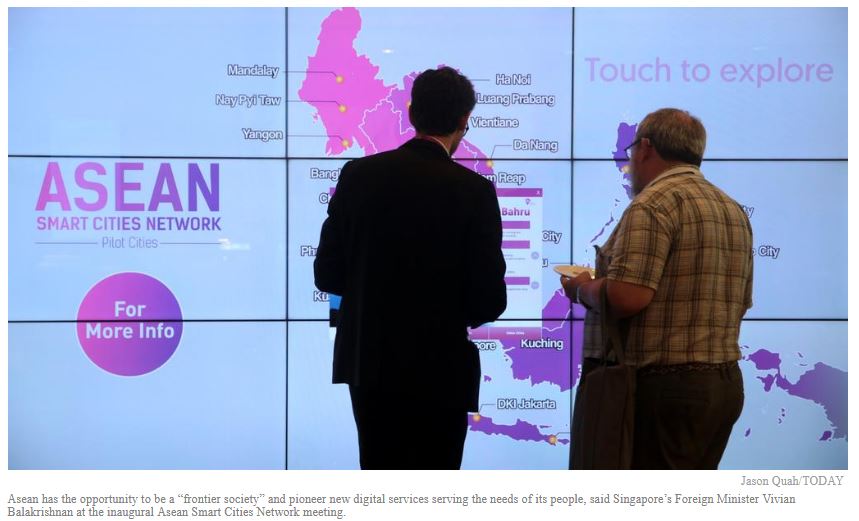Five agreements inked to take Asean’s smart cities plan forward
SINGAPORE — In Thailand’s Chonburi province, a smart city — also the country’s largest industrial city — is aiming to rely solely on itself for power using renewable energy sources.
The Amata Smart City Chonburi, which houses 5,000 expatriates and 200,000 workers, plans to set up a Smart Grid Project and build a new waste-to-energy power plant, among other measures.
On Sunday (July 8), Amata signed a letter of intent with the Yokohama Urban Solution Alliance at the inaugural Association of South-east Asian Nations (Asean) Smart Cities Network (ASCN) meeting, to work on its smart energy management system.
It was one of five agreements inked between ASCN cities, solution providers and external partners on Sunday.
The ASCN was established in April and has 26 pilot cities such as Yangon (Myanmar), Cebu (the Philippines) and Luang Prabang (Laos) on board.
Asean has the opportunity to be a “frontier society” and pioneer new digital services serving the needs of its people, said Singapore’s Foreign Minister Vivian Balakrishnan at the meeting.
By 2030, 90 million more people in the Asean are expected to be living in cities, and “middleweight” cities of between 200,000 and two million residents will drive 40 per cent of the region’s growth, he said.
Transport, housing and IT networks are already starting to feel the strain from this trend. At the same time, technologies such as robotics and artificial intelligence are transforming the way people live, work and play, he said.
“We need to get ahead of this curve primarily because we need to ensure that our citizens will continue to have access to good jobs, good pay… and that they will be able to feel that this revolution benefits them, their families and their children for the future,” he said.
The ASCN will respect the Asean members’ sociocultural, political and economic diversity. Each member will have their own national systems but they will be interoperable.
“Because we are diverse, we will not impose a monolithic system on everyone. Whether you talk about e-payments or planning or logistics, I do not believe that there will be a single dominant system across Asean,” said Dr Balakrishnan.
According to him, Thailand and Vietnam are supportive of further developing the ASCN in 2019 and 2020, respectively, when they chair Asean after Singapore’s stint this year.
Speaking to reporters, Dr Passakon Prathombutr, Thailand’s ASCN chief smart city officer, agreed that different cities have to adapt their technologies to their own culture and climate.
“Technology in civilisations in Europe may not fit in Battambang (in Cambodia) or Chonburi,” said Dr Passakon, who is also senior executive vice-president of Thailand’s Digital Economy Promotion Agency.
Dr Balakrishnan said the ASCN’s framework and city-specific action plans are nearly finalised.
For instance, Banyuwangi in Indonesia has proposed a “smart kampung” that aims to improve access to public services for villagers and encourage them to sell their products on digital online markets.
The final framework is expected to be adopted by Asean leaders at the 33rd Asean Summit in November.
Sunday’s meeting – which took place at the Marina Bay Sands Expo and Convention Centre, held alongside the World Cities Summit – was co-organised by Singapore’s Ministry of Foreign Affairs and the Centre for Liveable Cities, in partnership with Temasek Foundation Connects.
Source: https://www.todayonline.com/singapore/five-agreements-inked-take-aseans-smart-cities-plan-forward


 English
English




